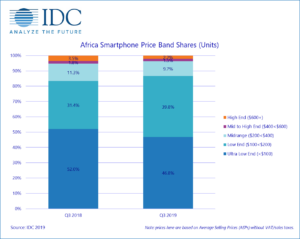While market saturation and U.S. – China tensions are placing the global smartphone market under intense pressure, new research from International Data Corporations shows that the African smartphone market saw shipments increase 4.0% quarter on quarter in Q3 2019 to total 22.6 million units.
The firm’s latest Quarterly Mobile Phone Tracker shows that Africa’s overall mobile phone market reached 55.8 million units in Q3 2019, with feature phones accounting for 59.4% of this total versus smartphones at 40.6%.
The growth in the smartphone space was spurred by the strong performance of the three biggest markets in Africa – Nigeria, South Africa, and Egypt. This was largely driven by the huge influx of affordable models that have recently been launched in these markets, while the relative stability of the Nigerian naira (NGN) and appreciation of the Egyptian Pound (EGP) also helped stir an increase in consumer demand.
Transsion brands (Tecno, Infinix, and Itel) continued to lead the feature phone space in Q3 2019, with a combined unit share of 64.0%. Nokia was next in line with 10.0% share. In the smartphone space, Transsion (36.2%), Samsung (23.9%), and Huawei (11.4%) led the way in unit terms; however, in value terms, Samsung was the clear leader with 33.2% share, followed by Transsion (22.4%) and Huawei (15.6%).
“Samsung shook the market up this year with the launch of its new A series of devices, which combine excellent value for money with Samsung’s well-established brand equity,” says Taher Abdel-Hameed, a senior research analyst at IDC. “This move spurred a significant increase in Samsung’s shipments across most African countries.
“Samsung recorded remarkable year-on-year growth of 61.4% in the low-end price band ($100-$200) in Q3 2019, and its move into this space has pushed Chinese brands to offer more affordable devices. Local African brands have traditionally focused on filling in for the absence of global brands in the entry-level smartphone segment, so these latest developments have put them in a difficult situation, causing their volumes to decline 33.6% year on year in Q3 2019.”
Africa’s smartphone market is also changing from a price band perspective, with the $100-$200 category seeing its share of shipments increase from 31.4% in Q3 2018 to 39.8% in Q3 2019. This growth was largely driven by the launch of new Samsung and Transsion models. The ultra-low-end band (below $100) has been declining in recent quarters and losing share to the low-end price band as brands move their device portfolios towards larger screen sizes and 4G capabilities.
“2019 will prove to have been a pivotal year for the African smartphone market,” says Ramazan Yavuz, a research manager at IDC. “4G devices are now dominating the market like never before, accounting for 73.0% of shipments. Screen sizes are also getting larger, with devices equipped with 6-inch screens and above now accounting for 41.7% of shipments, up from just 9.0% a year ago.”
IDC expects Africa’s overall mobile phone market to total 218.2 million units for 2019 as a whole. Smartphone shipments will total 91.0 million units for the year, up 3.2% on 2018, and the introduction of more affordable devices will help drive progress in this space over the coming years. Feature phone shipments are expected to remain flat at 127.2 million units for 2019, up just 0.1% year on year, as the transition to smartphone gathers momentum.
About IDC
International Data Corporation (IDC) is the premier global provider of market intelligence, advisory services, and events for the information technology, telecommunications, and consumer technology markets. With more than 1,100 analysts worldwide, IDC offers global, regional, and local expertise on technology and industry opportunities and trends in over 110 countries. IDC’s analysis and insight helps IT professionals, business executives, and the investment community to make fact-based technology decisions and to achieve their key business objectives. Founded in 1964, IDC is a subsidiary of IDG, the world’s leading technology media, research, and events company. To learn more about IDC, please visit www.idc.com. Follow IDC on Twitter at @IDC.
IDC in the Middle East, Turkey, and Africa
For the Middle East, Turkey, and Africa region, IDC retains a coordinated network of offices in Riyadh, Nairobi, Lagos, Johannesburg, Cairo, and Istanbul, with a regional center in Dubai. Our coverage couples local insight with an international perspective to provide a comprehensive understanding of markets in these dynamic regions. Our market intelligence services are unparalleled in depth, consistency, scope, and accuracy. IDC Middle East, Africa, and Turkey currently fields over 130 analysts, consultants, and conference associates across the region. To learn more about IDC MEA, please visit www.idc.com/mea.

